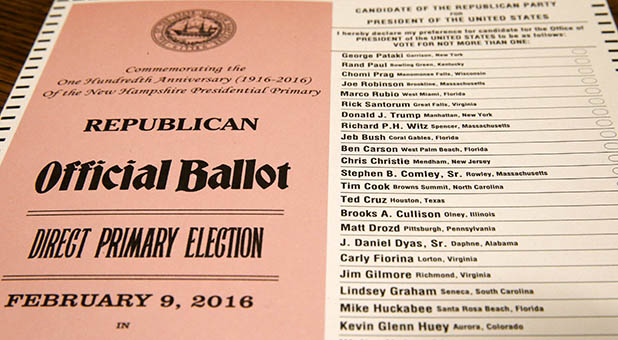What Christians Should Know About the New Hampshire Primary
For Christians who are just becoming acquainted with the presidential nominating process, there’s a lot to learn—and to pray about.
Yes, there are issues that should be important to every Christians, but there are factors in the process that should be considered and prayed over, as well. So, here are six things you need to know about the first-in-the-nation primary election, and what it means for the future of the 2016 race to the White House.
1. It’s a Primary, Not a Caucus
Unlike Iowa, New Hampshire voters participate in a primary, which is just like a regular election, except you are choosing among several candidates from the same party. It’s an all-day event, not a short-duration event like the Iowa Caucuses. And, there are actually more candidates on the official ballot than were on Iowans’ caucus ballots.
2. This Is the Centennial Year
The first New Hampshire Primary Election was held in 1916, making this year’s primary the centennial event for the Granite State. There has been a big push to celebrate this historical legacy throughout the election year. Fun Fact: The winners of the 1916 primary were former President Theodore Roosevelt (R) and incumbent President Woodrow Wilson (D).
3. Weather Is a Factor
Weather could be a factor, as well. The National Weather Service says New Hampshire, and much of New England will be impacted by winter weather through Wednesday afternoon. That’s not unusual for February, and with record-setting turnout expected, that means many will be traveling about the Granite State.
4. Voting Begins in 9 Hours
The voting process begins at midnight in three very tiny villages in northern New Hampshire: Dixville Notch (nine voters), Hart’s Location (42 voters) and Millsfield (29 voters). State law allows for the midnight vote if the voters unanimously choose to do so. While Dixville Notch is most recognized for this tradition because it has been doing it longest, but Hart’s Location actually started the tradition in 1948. They will be the first locations to vote in the U.S. in November, as well.
5. Upsets Aren’t Unusual
The old saying, “Iowa picks corn, New Hampshire picks presidents,” is good for maintaining a friendly rivalry between the two early voting states, but it’s hardly accurate. Upsets and unconventional results are just as much a part of the Granite State’s legacy as it is Iowa’s. For instance, in 1920, Herbert Hoover won all of New Hampshire’s Democrat delegates. In 1952, Gen. Dwight D. Eisenhower knocked off the GOP favorite, Robert A. Taft, en route to the White House. New Hampshire is also famous for having knocked out incumbent presidents Harry S. Truman and Lyndon B. Johnson.
6. New Hampshire’s Demographics
One reason why Iowa and New Hampshire’s results have differed so greatly over the last few decades is a byproduct of the latter’s spiritual decline. In 2000, roughly 25 percent of GOP voters identified as evangelical Christians. In 2008, that fell to 20 percent. Today, it’s less than 15 percent. New Hampshire is usually at the bottom of the list of states ranked by percentage of citizens who identify as Christian. In 2010, it was right around 35 percent—only Vermont was worse.
Putting it all together, for Christians who are praying over tomorrow’s primary election, the time to begin praying is now. Prayers need to go all around, for the candidates, the voters, the campaign staffs, for the media covering it and for the state of New Hampshire as a whole.
And if you’re discouraged because the polls say your candidate won’t do well, don’t give up. New Hampshire is far from decided. So, “Keep Calm” and keep praying.




























































